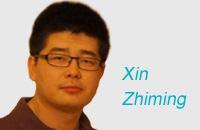Goodbye to guanxi in the job market
By Yang Guoying (China Daily) Updated: 2014-06-23 07:30Tang Jun, a famous professional manager in China wrote part of an open letter to 7 million college graduates this year, saying that no matter whether for work or in life, people can't do without relationships, or guanxi, in China, which means one's social networks are of the upmost importance for one's personal development. So for students, using the referral from social acquaintances can be a good way to get a job because such guanxi is a person's unique resource.
Although he wrote less than 100 words of the 1,000-word open letter, it was not wise for a motivational idol like Tang to promote tacit rules in public, and it went against his intention, which was to encourage those young students who have a low starting point to be successful.
In recent years, especially with China's economic growth slowing nowadays, the competition for jobs has become increasingly fierce. With the college enrollment expanding over the last 15 years, the number of college graduates has risen sharply year by year, and it approaches 7 million this year, seven times the number 15 years ago.
Some college graduates may use personal guanxi to get a job, however, it is impossible for all of them to use their connections to gain a good job. So it seems like a pseudo-proposition because guanxi cannot change the supply and demand relationship in China's job market.
Also the competition for jobs is unfair if it is dependent on a student's background rather than ability. In reality, most students are from ordinary families and they do not have a family background that provides them with the necessary connections to get a good job.
In a market-oriented economy, the job market should follow market rule like any other commercial market, so it is the survival of the fittest. To be more specific, the comprehensive competitiveness of graduates as talented workers in a particular field should be assessed, instead of their social connections.
Otherwise, if a few students with better family backgrounds use their unique guanxi to get a job, it will reduce the job opportunities for graduates without such connections, and it will inevitable mean more obstacles in the way of students who were born poor to live a better life. Therefore, the use of guanxi for job hunting should not be promoted among college students, as it is unfair and unhealthy.
In addition, guanxi is an outdated employment attitude. The practice of using connections was popular in the past mainly because economic reform in China was not completed and there was much space for power-based rent-seeking, so that it was easier for college graduates with better family backgrounds to get a good job. And companies might find more business opportunities by employing graduates with better family backgrounds even though they might be less capable than students from poorer backgrounds.
However, with the advancing of economic reform and the central government serious about fighting corruption, employers are beginning to pay more attention to an applicant's capabilities rather than their background. Most companies have established better human resource systems nowadays, and many employers prefer hiring talented individuals on their merit.
In Chinese, the word guanxi used to be a neutral word, meaning the connections between people or objects. But, the latent rules in our society have turned this word into a derogatory term, meaning the use of connections as a means of gaining an advantage over others.
To some extent, a healthy guanxi theory, can be applied and promoted in universities. Different from the use of connections as lubrication, approvals from teachers and internship units can help those graduates who work hard in college to get recommendations for jobs. Such a positive guanxi theory is worth promoting in society.
Meanwhile, universities and the education authorities need to rethink their strategies, including their enrollment expansion plans, and switch their focus from academic talent to skilled talent in order to resolve the imbalance between supply and demand in the job market.
The author is a researcher at the China Finance Think Tank.











